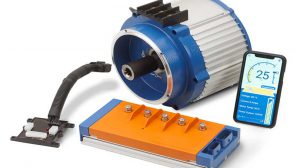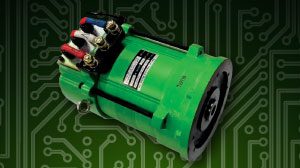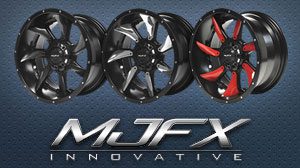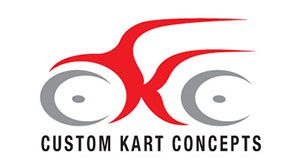By: Matt Vallez
This article original appeared in the July / August issue of Golf Car News Magazine and has been reprinted for this issue.
Today we are going to talk about pistons and rings, more precisely about the way piston rings fit into piston grooves. There are a lot of different ways that piston rings fit into the piston groove. For instance most 2-cycle (E-Z-GO & Yamaha) pistons have a tapered or beveled inside edge also called an upper side keystone ring. This type of piston ring must be put in with it’s tapered side facing up. The rings will not seat into the groove if put in with the taper side down. Also putting the backside or rear edge of a piston ring into the groove is not an accurate way to check if a tapered ring is the correct size for that piston ring groove.
This time of year I receive numerous calls claming that piston rings do not fit the piston ring groves and are the incorrect size. Usually I can explain about the tapered side facing up and fix the misunderstanding, in extreme cases I will put the rings on the piston and send it to the customer. To make things a little more confusing aftermarket rings and not always marked the same way as the O.E.M. rings. Below is a diagram that should help to clear up some of the confusion with the 2-cycle or any tapered piston rings.
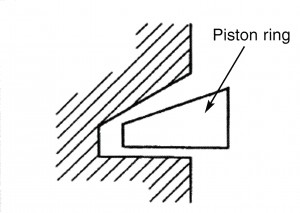
If you were confused with the two cycle rings the 4-cycle piston rings are even more difficult. All 4-cycle pistons are not the same. What is common about the 4-cycle piston & rings are that they all have three ring grooves. The top groove is for the compression ring, middle is for the wiper ring and the bottom groove is for the oil ring. There are different types of oil rings, some are 3 piece and others are one. Also different types of compression rings, some are tapered some are not. The compression rings for Yamaha G2 & G9 piston are tapered. The most important thing to remember about 4-cycle pistons and rings are that they are all different. Each ring fits in one groove and one groove only.
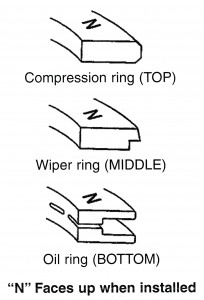 It is important to get the correct rings in the proper ring groove. Failure to do so will make it impossible to assemble the engine or even worse, cause damage to the cylinder if you are able to get the incorrectly assembled piston and ring into the cylinder. Aftermarket pistons and rings are not necessarily marked like the O.E.M. piston & rings. The diagram below should be helpful for getting the 4-cycle rings correct.
It is important to get the correct rings in the proper ring groove. Failure to do so will make it impossible to assemble the engine or even worse, cause damage to the cylinder if you are able to get the incorrectly assembled piston and ring into the cylinder. Aftermarket pistons and rings are not necessarily marked like the O.E.M. piston & rings. The diagram below should be helpful for getting the 4-cycle rings correct.
Aftermarket pistons and rings are made of the highest quality materials and produced to exact tolerances. It is worth checking to be sure that the rings are going into proper groove in the correct direction before assuming that the piston & rings are faulty. Having the knowledge to perform a task properly the first time is invaluable; it will not only save time and energy but also money. I hope that this will be helpful to all who take time to read it.





